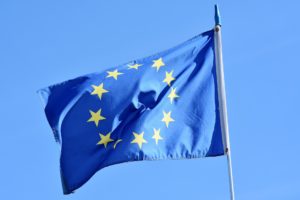Highlights from the Past Week
CW 45 / Monday, 8 to Thursday, 11 November: Mini-Plenary Sessions Week (Brussels);
DIGITAL SERVICES ACT I – COUNCIL CIRCULATES LAST DRAFT: As reported by Politico Pro (paywall), Slovenia sent the last draft of the Council position on the DSA to Member States on Friday (PDF).
The text states: “There has been, in particular, a strong and wide support among Member States to preserve the three main principles set up by the E-Commerce Directive: the country of origin principle, the principle of the conditional liability exemption, and the prohibition of general monitoring obligations.”
The Council has affirmed the horizontal nature of the DSA, but has also extended its scope to very large search engines (VLOSE), as well as broadening the scope of the “Know Your Business Customer” (KYBC) obligation by introducing a definition of marketplaces. New elements which have been introduced include a regulation on “Compliance by Design” against so-called “Dark Patterns” (Art. 24b DSA).
The text also features the competence of the EU Commission, which is being particularly driven by France. French Digital Minister Cédric O told CNBC: “It’s quite logical: we have a single market, and we need a single enforcer. This will allow us two things: first, the same regulator to apply rules to the big platforms, no matter where their headquarters are, and to be quicker and faster in terms of implementation.”
In contrast, last week at a panel discussion of the German Bar Association, the President of the German federal competition authority (the Bundeskartellamt), Andreas Mundt, spoke out in favour of strengthening the national competition authorities.
After the text has been approved this coming Wednesday in COREPER I by the deputy ambassadors, it is to be confirmed in the Council on 25 November (Agenda, PDF).
DIGITAL SERVICES ACT II – PARLIAMENT NEEDS MORE TIME: After the original date for the vote in the Internal Market Committee (IMCO) had to be postponed, the rapporteur Ch. Schaldemose (S&D) expects that the vote in the Internal Market Committee can take place in December. Subsequently, the position could be passed through Parliament in January 2022.
Meanwhile, the deletion periods of 24 hours or seven days proposed by rapporteur C. Schaldemose (S&D) were rejected by all shadow rapporteurs (see Politico Pro, paywall).
Last week, eco, together with 15 other organisations, sent an open letter (PDF) to the members of the European Parliament.
DIGITAL MARKETS ACT I – COREPER CONFIRMS POSITION: The Permanent Representatives of the Member States last week confirmed the draft of the DMA from 5 November. The Council of the EU is tightening the measures of the regulation in part. The Commission is to be assisted in the application of the regulation by the national competition authorities. In particular, the Council envisages the possibility for the authorities to initiate investigations and hand them over to the Commission to impose sanctions. The final confirmation is to take place in the Competitiveness Council on 25 November (Agenda, PDF).
DIGITAL MARKETS ACT II – IMCO AGREEMENT ON 22 NOVEMBER: Major progress is being made in the negotiations on the DMA in the Internal Market Committee (IMCO). Contexte (paywall, FR) published the latest compromises (A, B, C and E) by rapporteur A. Schwab on market investigations, investigative powers and compliance (PDF).
These add references to the protection of whistleblowers and the creation of the post of a compliance representative to the regulation. At the same time, additions introduced in earlier compromises have been confirmed: Fines of up to 20% of worldwide turnover, restrictions on acquisitions in case of systematic breaches of the regulation, and restrictions on targeted advertising.
As Politico Pro (paywall) reports, the rapporteur has succeeded in raising the thresholds (turnover 8 billion Euro, market capitalisation 80 billion Euro). This would bring only about eight companies into the scope. In addition, agreement has been reached at the technical level to integrate number-independent interpersonal communications services into the scope concerning interoperability obligations for ancillary services.
Difficulties seem to have arisen in the meanwhile regarding agreeing on rules on targeted advertising; in this respect, both S&D and Renew have so far been unsuccessful with their amendments. On its part, Meta has announced that it will no longer allow advertisers to serve ads based on data linked to sensitive categories such as race, religion or political affiliation (see Euractiv).
The vote in the committee is scheduled for next Monday, 22 November.
DIGITAL SERVICES ACT PACKAGE – BRETON: SPEED IS EVERYTHING: “Europe is serious about regulating what still resembles a digital Wild West.
Speed is everything. #Platforms must be accountable.
Lobbying will not interfere with the greater interest of the 🇪🇺 people.” tweeted Commissioner T. Breton last week in the wake of Frances Haugen’s hearing in the European Parliament.
EPRIVACY – SLOVENIA PUSHING FOR PROGRESS: The Slovenian Presidency is urging EU delegations to move forward with talks on the ePrivacy Regulation ahead of negotiations with the European Parliament that are scheduled for this Thursday. In the four-column document (PDF), dated from 12 November and published by Politico Pro (paywall), the Presidency is seeking Member States’ support for a new compromise agreement covering chapters three, five and six of the proposal.
The document highlights the continuing disagreement between the Council and the Parliament on a number of key issues, including positions on the definition of users and end-users, and the Parliament’s bid for a register that would create an opt-out system for direct marketing calls.
CYBERSECURITY – CURRENT COUNCIL DRAFT ON NIS2: The Slovenian Presidency’s latest text on NIS2 from last week (PDF) once again changes the scope of application. The proposed text now includes the following areas in Annex I (new areas are in bold):
8.a ICT-service providers (b2b)
- (a) ICT service design and conception:
- Software development providers
- Software maintenance providers
- Strategy or IT advisory providers
- (b) ICT service provision
- Cloud computing service providers
- Data Centre service providers
- (c) ICT service management
- Managed service providers (MSP)
- Managed Security service providers (MSSP)
- Security audit providers
ARTIFICIAL INTELLIGENCE I – PRESENTATION OF DRAFT OF AIDA FINAL REPORT: Last week, the rapporteur in the Special Committee on Artificial Intelligence in the Digital Age, A. Voss (EPP), presented his draft report (PDF).
One of the recommendations included in the report concerns the introduction of a limited new liability mechanism for the operator. High-risk systems should be subject to strict liability with compulsory insurance; systems with a lower risk classification, on the other hand, should be subject to a presumption of fault against the operator.
On the issue of the use of AI systems by law enforcement agencies, what is considered to be of paramount importance for the safety and security of citizens is that the authorities are as far advanced as possible in AI development – which is why “the full use of the potential of digital technologies (should be harnessed) to prevent and investigate serious crimes through real-time facial recognition in select locations”.
The same applies, according to the draft report, to “diligently developed algorithms for crime prevention and investigation, based on highly qualitative data”. These could offer “a higher level of efficiency, neutrality and legal certainty than human law enforcement agents” and should thus be promoted.
Neither the shadow rapporteurs from S&D, Renew nor the Greens endorse the presented text (see Contexte, FR, paywall). The vote in the AIDA Committee is scheduled for March 2022. (see EP press release).
ARTIFICIAL INTELLIGENCE II – COMMITTEE RESPONSIBILITY: On Thursday, the leaders of the political groups in the European Parliament are due to meet to discuss, among other topics, the resolution of the deadlock over the responsibilites for the AI Act in the Parliament. A shared responsibility between the Internal Market Committee and the Civil Liberties Committee seems most likely.
COPYRIGHT – SWEDEN PUBLISHES MEMORANDUM: As reported by “The IPKat”, Sweden has presented a memorandum on the transposition of the DSM Directive, which is open for comments until 13 December. An unofficial English translation has also been published. The text sets out, among other things, that:
- there should be no absolute prohibition on preventing lawful uses;
- a form of ex ante blocking should be introduced; and;
- Article 14 of the e-Commerce Directive should become inapplicable to online content sharing providers covered by Article 17 of the DSM Directive.
CHILD ABUSE CONTENT – OUTCOME OF MINISTERIAL CONFERENCE: Last week, the Slovenian Presidency of the Council of the EU organised a two-day Ministerial Conference on the Prevention and Investigation of Child Sexual Abuse. At the conference, a joint declaration was issued by the Ministers responsible for Home Affairs of the EU Member States, the Schengen Associated States, the Western Balkan partners and the United States of America, as well as representatives of the European Commission, the European Parliament, Europol and Eurojust. In this joint final declaration (PDF), the signatories call for, among other things, more reconnaisance and the use of AI to identify the victims and perpetrators and to intensify international cooperation. The importance of appropriate and feasible solutions regarding data retention, encryption, e-evidence and the darknet environment was highlighted.
EU DIGITAL INDEX – INADEQUATE PROGRESS: The EU Commission has published the results of the Digital Economy and Society Index (DESI) 2021, which tracks the progress of EU Member States in digital competitiveness in the areas of human capital, broadband connectivity, the integration of digital technology by businesses and digital public services. (see COM press release)
The Commission warned that European countries and companies were lagging behind in the roll-out of 5G telecoms networks, the use of cloud computing and the training of technicians, and that the EU could fall behind in its 2030 digital targets.
Only 13 countries have built next-generation 5G networks and 59 percent of European households will have access to high-speed Internet by 2020. This is still far from the Commission’s goal of providing the entire EU with high-speed access and 5G Internet by 2030.
CORPORATE TAXES – NEW COUNTRY-BY-COUNTRY REPORTING RULES: The EU Parliament confirmed last week that all companies that have achieved a total worldwide revenue of more than 750 million Euro in each of the last two financial years will in future have to disclose their income tax information and break it down per country. To avoid unnecessary administrative burdens, the directive contains a list of the information requested. After its entry into force, the EU Member States will have 18 months to transpose it into their national laws. (see EP press release)
NSO GROUP – WHATSAPP/META LAWSUIT IN LUXEMBOURG: As Delano reports, WhatsApp’s lawsuit against NSO Group may be dealt with in Luxembourg after NSO Group’s immunity claim was dismissed by a California court.
WhatsApp had launched legal proceedings against NSO in 2019 over allegations for hacking around 1,400 users with the NSO spyware. According to WhatsApp, at least 100 of these users were civil society members, such as journalists or activists.
EU COURT – SANCTIONS AGAINST GOOGLE CONFIRMED: In its ruling last week, the General Court of the European Union confirmed the EU Commission’s 2.42 billion Euro fine against Google from 2017. The court had concluded that Google had favoured its own Shopping Unit over competitors’ services. The ruling is not legally binding. (see Euractiv)
EDPS – DATA PROTECTION CONFERENCE IN JUNE 2022: The European Data Protection Supervisor announced that the conference entitled “The Future of Data Protection: Effective Enforcement in the Digital World” will take place on 16 and 17 June 2022.
Relevant Publications, including from the EP Think Tank:
- Plenary round-up – November I 2021 (At a Glance)
- Revision of the Renewable Energy Directive: Fit for 55 package (Briefing)
- Mechanism to resolve legal and administrative obstacles in a cross-border context (Briefing)
- Disclosure of income tax information by certain undertakings and branches (At a Glance)
Outlook for the Coming Week
You can find a list of the upcoming dates of the European Parliament here. You can find the provisional meeting calendar for 2022 here (PDF).
An overview of the most important dates of the Council week can be found here, the meeting calendar is accessible here, the list of the main topics for the coming 14 days is available here, and an overview of the Slovenian Presidency can be found here.
Included among these dates are:
Summit and Ministry Meetings:
- Agriculture and Fisheries Council, Monday, 15 November – Agenda, A Items, Background Brief;
- Foreign Affairs Council, Monday, 15 November – Agenda, A Items, Background Brief;
- Foreign Affairs Council (Defence), Tuesday, 16 November – Agenda, A Items, Background Brief;
- General Affairs Council (Cohesion), Thursday, 18 November – Agenda, A Items;
- Foreign Affairs Council (Development), Friday, 19 November – Agenda, A Items;
Preparatory Bodies:
- Working Party on Telecommunications and Information Society (incl. E-ID, Path to the Digital Decade, ePrivacy, AI), Monday, 15, Tuesday, 16 and Thursday, 18 November;
- Working Party on Tax Questions (Indirect Taxation), Monday, 15 and Thursday, 18 November;
- Working Party on Competitiveness and Growth (Industry), Monday, 15 November;
- Horizontal Working Party on Cyber Issues (incl. NIS2), Monday, 15 November;
- Coordinating Committee in the Area of Police and Judicial Cooperation in Criminal Matters (CATS) (incl. E-Evidence), Wednesday, 17 November;
- Horizontal Working Party on Cyber Issues (Cyber Diplomacy Toolbox), Wednesday, 17 November;
- Working Party on Consumer Protection and Information (incl. Product Safety, Consumer Credits), Wednesday, 17 and Thursday, 18 November;
- Working Group on Information (incl. Social Media Influencers), Thursday, 18 November;
- Working Party on Cooperation in Criminal Matters (COPEN), Friday, 12 November;
- COREPER I (incl. DSA, ePrivacy), Wednesday, 17 and Friday, 19 November;
- COREPER II (incl. Commission 2022 Work Programme), Wednesday, 17 November;
Information about the weekly Commission meeting can be found in the preview (PDF) or (at short notice) in the current agenda. One topic of particular relevance is the “Security and Justice in the Digital World” package (scheduled for 1 December).
The following topics are scheduled for the coming week:
- Global Gateway Initiative (connectivity)
- Nature: soil, deforestation, waste
- Soil strategy
- Waste shipment
- Minimising the risk of deforestation and forest degradation associated with products placed on the EU market
- Review of competition policy:
- fit for new challenges(tbc)
You can find the judicial calendar of the ECJ here. On 18 November, the opinions are expected on the joint proceedings of SpaceNet (C-793/19) and Telekom Deutschland (C-794/19) on data retention.
European Parliament Committees
CW 46 / Monday, 15 to Thursday, 18 November: Political Group and Committee Meetings Week (Brussels);
LIBE Committee (EP)
Current Meetings
- Thursday, 18 November 2021, 15.00-18.00 (Brussels)
Excerpts from the Draft Agenda
From the perspective of the Internet industry, there are no topics of relevance on the current draft agenda.
Further Meetings (Calendar)
- Monday, 29 November 2021, 15.45-18.45 (Brussels)
- Tuesday, 30 November 2021, 9.00-12.00 (Brussels)
- Thursday, 9 December 2021, 9.00-12.00 (Brussels)
JURI Committee (EP)
Current Meetings
- Monday, 15 November (Brussels)
- Thursday, 18 November (Brussels)
Excerpts from the Draft Agenda
From the perspective of the Internet industry, there are no topics of relevance on the current draft agenda.
Further Meetings (Calendar)
- Wednesday/Thursday, 1/2 December 2021 (Brussels)
Dossiers Timetable (12 November 2021)
ITRE Committee (EP)
Current Meetings
- None
Further Meetings (Calendar)
- Tuesday, 30 November 2021, 9.00-12.00, 13.45-15.45 and 16.45-18.45 (Brussels)
Dossiers Timetable (27 October 2021)
IMCO Committee (EP)
Current Meetings
- None
Further Meetings (Calendar)
- Wednesday, 1 December 2021, 9.30-12.30 and 13.45-15.45 (Brussels)
Dossiers Timetable (September 2021)
CULT Committee (EP)
Current Meetings
- Monday, 15 November 2021 (Brussels)
Excerpts from the Draft Agenda
From the perspective of the Internet industry, there are no topics of relevance on the current draft agenda.
Further Meetings (Calendar)
- Wednesday/Thursday, 1/2 December 2021 (Brussels)
AIDA Committee (EP) – Special Committee on Artificial Intelligence in a Digital Age
Current Meetings
- None
Further Meetings (Calendar)
- Tuesday, 30 November 2021, 16.45-18.45 (Brussels)
Overview of the Hearings
INGE (EP) – Special Committee on Foreign Interference in all Democratic Processes in the European Union, including Disinformation
Current Meetings
- Monday, 15 November 2021, 16.45-18.45 (Brussels) –Recording
Excerpts from the Draft Agenda
…
- Hearing on disinformation and conspiracy theories: vaccination, climate change, migration, etc.– Chine Labbe, Managing Editor & Vice President Partnerships, Europe, NewsGuard Technologies
– Katarína Klingová, Senior Research Fellow, Centre for Democracy & Resilience, Globsec
– Sander van der Linden, Professor of Social Psychology in Society, Director of Cambridge Social Decision-Making Lab, Department of Psychology, University of Cambridge
– Alberto Neidhardt, Policy Analyst in the European Migration and Diversity programme and Paul Butcher, Policy Analyst in the European Politics and Institutions programme, European Policy Centre
…
Further Meetings (Calendar)
- Open
Overview of the Hearings
Further Scheduled Parliamentary Calendar Dates
- CW 47 / Monday, 22 to Thursday, 25 November: Plenary Sessions Week (Strasbourg);
- CW 48 / Monday, 29 November to Thursday, 2 December: Committee Meetings Week (Brussels);
- CW 49 / Monday, 6 to Thursday, 9. November: Political Group and Committee Meetings Week (Brussels).




